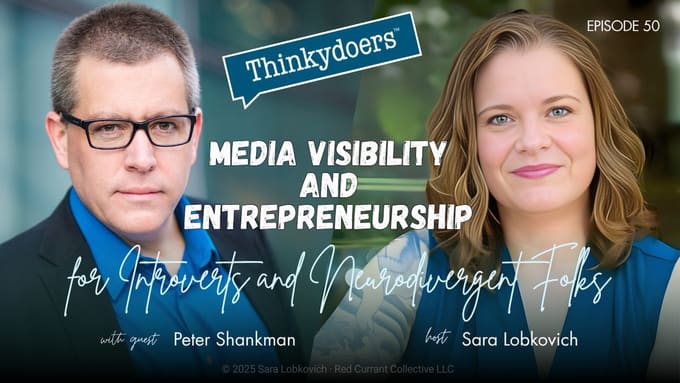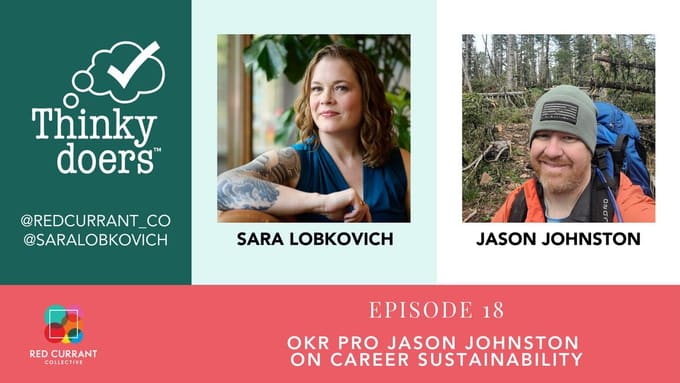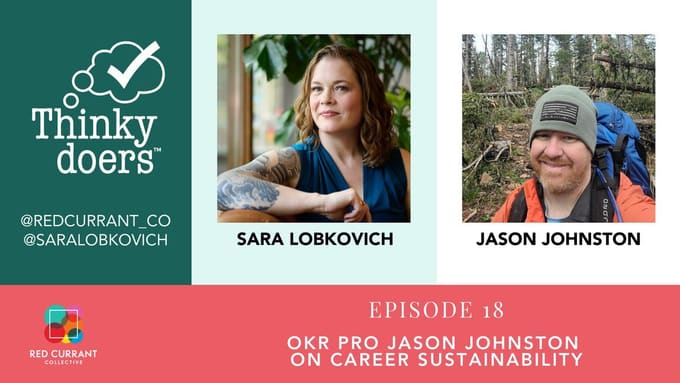October Theory: Gen-Z Discovers Quarterly Planning (and the Olds can learn a thing or two)
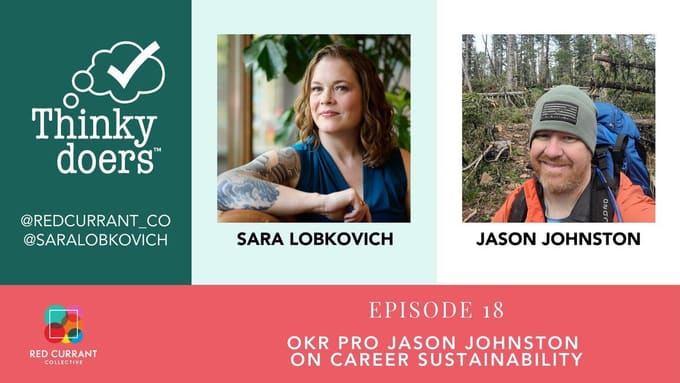
Is October the new January?
Gen Z thinks so, and they might be onto something.
In this Thinkydoers Short, I dive into the viral TikTok trend of “October Theory” and explore how it intersects with established business practices like quarterly planning and OKRs (Objectives and Key Results). Whether you’re a seasoned professional or just starting your career journey, this episode offers fresh insights on goal-setting and achievement.
Episode Highlights:
-
Introduction to “October Theory” / #OctoberTheory and its viral spread on TikTok
-
How October Theory aligns with business quarterly planning practices
-
What us Olds can learn from the youth on the importance of end-of-Q3 retrospectives and learning reviews
-
Introduction to Key Results for Gen Z goal-setters
-
The benefits of outcome-based goals over activity-based goals
Key Questions:
-
What is October Theory?
-
How does October Theory relate to business planning cycles?
-
What are Key Results in the context of OKRs?
-
Why are outcome-based goals more effective than activity-based goals?
Notable Quotes:
“Let’s listen to the next generation on this one and prioritize the end of Q3 reset.”
“Key results are a different kind of goal… We’re going to think about what would be really incredible to achieve in terms of impacts or quantifiable outcomes of our effort.”
“Instead of the risk of the all or nothing bad feelings that we get when we set just activity based goals, when we create key results, that’s what we’re pursuing… We get instantly curious, even if you’re not having any progress.”
Episode Chapters:
00:00 Introduction to Thinkydoer Shorts
01:15 Discovering October Theory
02:07 Understanding October Theory and Its Impact
03:43 The Power of Key Results for Gen Z
04:06 Implementing OKRs in Business
06:21 Creating Effective Key Results
09:02 The Benefits of Key Results Over Activity Goals
12:57 Conclusion and Join the Pre-Launch List for You Are A Strategist
Links and Resources:
-
Pre-launch list for “You Are a Strategist”: youareastrategist.com
-
Sara’s website: saralobkovich.com
-
Shortcut to Sara’s website: findrc.co

You don’t have to OKR alone!
Snag a copy of the No-BS OKRs Workbook PDF NOW for only $19 USD, and get started working with OKRs today!
Prefer a short course? Check out our fully-independent and self-paced short course (regularly $99, now only $49)
You do not have to OKR alone! And, I’d love to help!
-Sara Lobkovich , OKR Coach & Principal Consultant
Full Episode Transcript:
[00:00:00]
Welcome to Thinkydoer Shorts, where we embrace anti-perfection and dive straight into the messy middle of strategy, leadership, and personal and career growth.
I’m your host, Sara Lobkovich, creator of No-BS Objectives and Key Results,
host of the Thinkydoers podcast,
and I’m a strategy coach, big time goal nerd, and board certified
health and wellness coach with a focus on work life well-being. And in the next few minutes, we’ll explore a current topic or insight to spark your curiosity and provide you a pragmatic starting place to take action.
Let’s dive in.
Hey friends, I thought I would experiment with a new format because we keep getting really bogged down in edit. So I’ve been completely loving our interview shows that we’re putting together and there’s so much work that I haven’t been doing my solo shows.
But this weekend something came up that I couldn’t really wait [00:01:00] to put an episode together for.So this is an experiment in doing a quick off the cuff episode on a culturally relevant topic in I don’t know, 15 or so minutes or less. So I’m literally setting a timer so I can see it, so I don’t go on too long. On Friday night I was up late and, you know, on the phone, which is not good for sleep hygiene, But it had been a while since I looked at calls for story support on Quoted, which is a source that I use to find media appearances and to look for journalists who cover topics that I am a specialist in.
And there were a couple of calls for sources on something called October Theory. And when I saw TikTok October Theory goal setting,
I had to know more.so I caught up really quickly with a couple of news articles. Of course, I got on TikTok to go straight to the source and I completely missed the [00:02:00] debut of this topic because I’ve been so head down working on my books and everything else that I’m a little late to the party.
What is October Theory?
At this point, there’s something like 36 million posts about #OctoberTheory on TikTok alone.So first, what is October Theory?
October Theory is the idea that October is a great time to do your assessment of where you are, think retrospective, and take stock and decide what you want to set your goals around in advance of the new year. So some influencers talk about it like it’s a mini January. Like a mini set of New Year’s resolutions.
And some of the youths have this idea because we’re going into what they call cuffing season. So people are taking stock of their relationship status and wanting to make changes before we get into the hunker down for winter. There’s also an astrological element,Which [00:03:00] I find fascinating as a Libra Sun sign, but I’ll leave that to the TikTok experts. We’re going to talk about goal setting.
So while I was reading up and watching some of the TikToks on the topic, I felt like I was watching Gen Z discover quarterly planning for the first time. Which I’m not throwing shade, I think that’s really exciting.
So much of Gen Z, if my stepkids and their friends are any indication, are so mobilized for change naturally that the thought of them starting with quarterly goal setting personally or professionally early on just makes me think they could take over the world even faster, in a good way.
So this is a quick two-fer short. I’m going to be talking to my business listeners about what the youths are getting right about October Theory. And then I also want to introduce Gen Z to the concept of a key result, because it’s going to help you make change even faster than you’re naturally wired for.
And yes, I’m [00:04:00] talking about objectives and key results or OKRs, but these are not your parents or grandparents OKRs.
Why business leaders should pay attention to October Theory
So for my business listeners, many organizations plan on an annual cycle starting the year in January.
A lot of my clients begin their annual planning in, November, or sometimes even as late as December.
The other phenomenon I tend to observe in my business clients is we start out the year really strong with our focus on OKRs. We might do a solid Q2 reset
at the end of Q1, because we’ve learned a lot about how we might improve our OKRs for the year. And then a lot of organizations do that big mid year. So they take stock at mid year, see what they’ve learned. And see what to let go of, and then create their OKRs for Q3. But what tends to happen with that quarterly cycle is the Q3 reset kind of gets eaten by the strategic planning [00:05:00] that’s about to start.
So there’s this overlapping of our working toward our current year, year end goals, and planning for next year. And that overlap can mean that the goal setting and goal pursuit toward the end of the year can get pretty muddled.
I love the idea of this October theory, that October is a great time for a retrospective to look back on what we’ve learned this year, where we are in our current state, and then say, where do we want to be when we wake up on January 1st?
that’s no different from doing an OKR reset at the end of Q3. I just find a lot of organizations just kind of stop with their OKR rhythm at the end of Q3. I saw clients even in the last couple weeks, some of them, their quarterly reviews are on my calendar, and I saw cancellations of the quarterly review because people are so busy trying to get ready for budget season and strategic planning.
[00:06:00] So let’s listen to the next generation on this one and prioritize the end of Q3 reset.
Because the sand in the hourglass is really running out on 2024, and you most likely have some really important progress to be made on your goals before year end, even while we’re planning for next year.
Gen Z: Meet OKRs (or, at least, Key Results)
All right, now I want to introduce our Gen Z folks who are excited about October theory to the concept of a key result, and key results come from a collaborative goal setting model and practice called Objectives and Key Results or OKRs. OKRs have been used in big companies and by startups for a long, long time.
But I can completely understand how younger people entering the workforce or earlier in their career might encounter OKRs in the workplace and think, Oh my gosh, this is not for me. Like the, the way that OKRs get implemented doesn’t always [00:07:00] make a great sales pitch for them. The experiences people have with them aren’t always strong.
So, Gen Zers, if you haven’t yet encountered OKRs, let’s start you off right, and Gen Zers who have had a bad experience with OKRs in the workplace, let’s do a reboot here. The approach to OKRs that I work with, I call the No BS OKR model.
We create goals very quickly. Based exactly on what you’re doing with October Theory, based on taking stock of where we are and where we want to be, and then creating objectives and key results accordingly.
Today, I’m going to focus on key results and encourage you to experiment with creating your key results as part of your October Theory planning. When people are setting goals, their natural tendency a lot of times is to create goals around what they plan to do. So if you have goals today, you might look at that list and let’s inventory [00:08:00] how many of them are you deciding to do something or to complete an activity or even a quantified activity to do an activity a certain number of times.
It’s probably a fair number of them. So key results are a different kind of goal. And the structure that I use for a textbook key result is increase, decrease, improve, reduce, some kind of directional verb. A metric by a percentage or point change from start value to finish value.
Now, what’s the difference between creating goals around activity and creating goals around empirically measurable outcomes?
For one, you’re probably signing yourself up for way too many activity goals than you can actually achieve. It’s really common.
For two, you might complete all those activities that you planned and check off all those boxes and still not actually achieve whatever outcome or [00:09:00] result you really aspire to. OKRs define for us how we’re going to actually quantify success and progress. And it sounds counterintuitive, but setting empirically measurable key results around what we hope to achieve in terms of progress and success can actually be super motivating compared to just setting goals around our activities. If we create goals around our activities, and we don’t keep up with that plan, then we feel bad about not being able to check off those boxes.
It also causes problems for our tendency toward all or nothing thinking. So if we miss one activity,and that interrupts our habit around the activity we’re trying to complete. Then there’s a risk that you’re just going to backslide and feel bad and stop doing what you committed yourself to do.
Where when we create key results, we think about those differently. So when we create key results, we’re going to [00:10:00] think about what would be really incredible to achieve in terms of impacts or quantifiable outcomes of our effort. And we’re going to think about that in a stretch way because what you’re doing there is thinking about a future that doesn’t exist yet.
So there’s no way to accurately forecast what the result is going to be with certainty. We recognize we’re going into the unknown. We’re trying to change something.
It’s not a sure thing that you’re going to achieve it, although you’re going to try your best to, but just setting that measurable goal gives you something to work toward and then lean in to curiosity and learning about your progress. So instead of the risk of the all or nothing bad feelings that we get when we set just activity based goals, when we create key results, that’s what we’re If we’re pursuing a key result, and even if we’re not making progress, then the reaction we have isn’t, there’s something wrong with me [00:11:00] that I’m not achieving my goal.
I’m doing something wrong that I’m not achieving my goal. Instead, when we’re working with key results, We get instantly curious, even if you’re not having any progress. The question you can ask yourself is what’s going on that I’m not making progress on this goal, get curious. And then that gives you flexibility to adapt your activity plan.
So you can take stock, see what you might want to change in what you’re doing that will be designedTo advance your achievement of your key result
with nimbleness and flexibility about the situation that you’re operating in, which frankly changes from day to day. So those activity goals you’re used to setting, you set at a certain time, that’s your best guess at what needs to be done, and then you work toward them, but you’re in a changing world and the circumstances and situation and you yourself are changing.
it’s really common for those activity based goals to get stale or [00:12:00] to become no longer relevant before they’re achieved. Because with key results, we’re asking and answering the question, what would be really incredible to achieve if everything goes right? It lets you envision a future that doesn’t exist yet, the future that you want to create.
It enables you to work toward that future with clarity about what you’re trying to achieve.
And it lets you lean into curiosity,whether you are achieving progress on your key result. Whether you are not or whether it’s not moving, no matter what’s happening with that key result, you can check in with yourself, ask the question, what’s going on that this isn’t going well, or what’s going on that this is going so well?
Can I leverage that to accelerate my progress or to take what I’ve learned to improve my performance in some other area of my work or life?
All right, so that’s it. I’m going to wrap up for today. [00:13:00] If you’re curious about anything you’ve heard here, I would love to have you check out my upcoming book, You Are a Strategist, Using No-BS Objectives and Key Results to Get Big Things Done. You can join the book pre-launch list at youareastrategist.com. Now this book is a love letter to all of my listeners, but I would be so excited if this becomes the book that Gen Z learns about OKRs from.
Because I can’t wait to see what you do with Objectives and Key Results.
Thank you for tuning into this Thinkydoer Short today. Remember, progress beats perfection every time, and let’s practice building in public together. If you found value in today’s episode, Share it with a fellow Thinkydoer. We love your reviews. And for more resources and insights, visit saralobkovich.com. Or if that’s too hard to spell,there’s a shortcut [00:14:00] at findrc.co.
We’ll have our next full length episode out in just a couple days, continuing on the theme of mental health for Thinkydoers.
So until next time, stay curious and stay focused on what might be incredible to achieve.
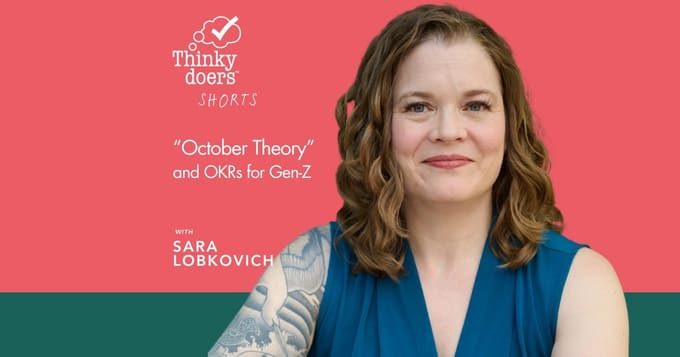
Best OKR Books of 2025
Curated reading list of the most impactful books on OKRs, strategy, and goal-setting. Includes classics and new releases with honest reviews.
See the List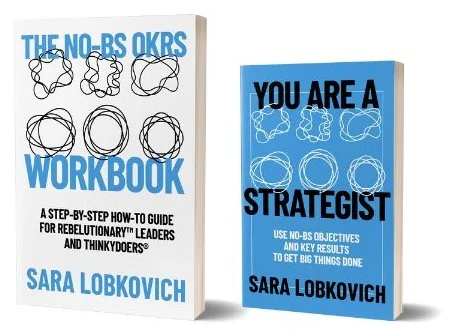
Get the Book
You Are a Strategist teaches you how to use No-BS OKRs to get big things done. Join 2,000+ coaches trained in this methodology.
Order Your Copy